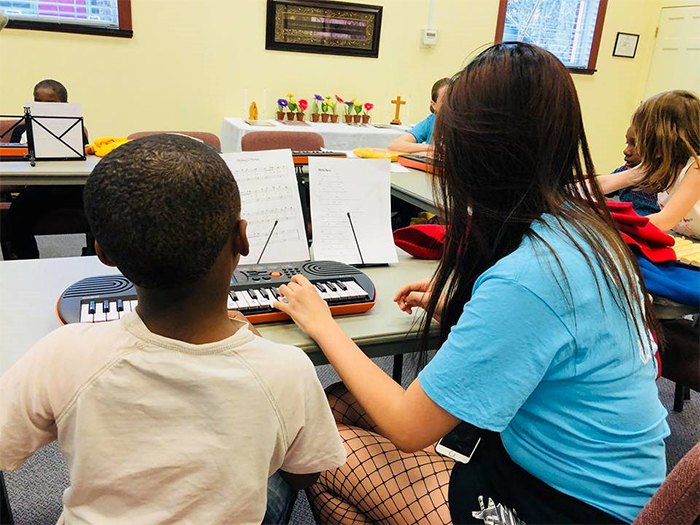Making Music Any Way: Student-Led Program Brings Benefits of Music Education Online

Professor of Music James Martin meets with community leaders to discuss the rollout of the new COMPOSED: Make Music Any Way! program. Photo by Tony Moore.
Dickinson College Civic Innovation Competition Winner announced
by MaryAlice Bitts-Jackson
The coronavirus (COVID-19) pandemic has dramatically affected the way students learn, practice and perform music together. As music programs are cut and deferred nationwide and learning goes fully or partially online, children are missing out on the enjoyment, confidence and community that ensemble music can bring as well as the interpersonal and analytical skills that come with mastering an instrument and playing in groups.
“Presently, many of our children are isolated by remote learning, unable to creatively express themselves and unable to reap the multiple benefits of playing an instrument or lifting their voices in song,” says Max Jacobs '21 (music), who along with fellow student-musicians Andrew Howe '21 (biochemistry) and Hannah Youmans '22 (music, Italian), reaped the benefits of music education as kids. “Hardest hit are disadvantaged communities where children do not have the resources to make music.”
So, with Professor of Music James Martin, these students are helping to help fill that gap by bringing music education programming safely into local students’ homes.
Their eight-week program, COMPOSED: Make Music Any Way!, is the winning entry for Dickinson’s Civic Innovation Competition: K-12 Youth Support, presented by the college’s Center for Civic Learning & Action in partnership with the Carlisle Action Network (CAN). Through it, the Dickinson students and professor make virtual music lessons and activities available to local fourth, fifth and sixth-grade students—a critical age group for the development of musical response and abilities—at a time when they may need it most.
Composing COMPOSED
The program draws inspiration from Composed, a student-run program launched by Rachael Smith '16, now director of the Professional Development and Engagement Center at San Francisco Conservatory. Working with local nonprofit organizations and under advisement by the music department, Composed brought Dickinson students into local schools to provide music lessons and loan instruments to local children in need.

Dickinson students in the Composed program brought special music programs into local schools. COMPOSED: Make Music Any Way! builds on that program to offer expanded offerings online. Photo courtesy of the Department of Music.
The new, virtual COMPOSED: Make Music Any Way! program expands on the original—both programmatically and in terms of the numbers of students who can participate in any given lesson or activity. Student-instructors introduce students to several popular instruments; facilitate performances and Q&As with Dickinsonians and outside professional musicians; and lead music-centered games and crafts that spark curiosity and creativity, improve ear training and build on their knowledge of different musical styles. Students and faculty from theatre, dance and the visual arts will also contribute to the interarts programming.
The program includes both synchronous and asynchronous material, allowing local families to enjoy some sessions together. And program participation counts as an internship for the student-instructors.
‘Pitch-perfect proposal’
During their livestreamed presentation to the judges for the Civic Innovation Competition, the COMPOSED: Make Music Any Way! group outlined the benefits of music appreciation and study, listed the resources they’d need to get the program up and running, and noted that Martin’s contacts in the local community would smooth the process.
Smith, who tuned in to the livestream from her home in San Francisco, said she was impressed by the students and excited by their ideas. The three judges agreed.
“It’s a pitch-perfect proposal!” said Catherine McDonald Davenport '87, contest judge as well as Dickinson's vice president for enrollment and dean of admissions.
As first-place winner, COMPOSED was awarded $2,000 in seed money. Four runners-up were also named, and among them, two of the teams—the Carlisle Victory Circle group, which aims to supply biking safety equipment and training and wellness counseling, and the Quarantine Tutors team, virtually connecting Dickinson student-tutors virtually with local youth—have responded to CCLA’s offer to partner on hammering out next steps.
A program for the times
Meanwhile, COMPOSED: Make Music Any Way! is poised for a fall rolllout. The team members note that every participating youngster can access the many benefits of music education, regardless of skill level, and can emerge with a connection to music they can continue to enjoy throughout their lives. That’s true for all generations. But as Howe adds, the need for this programming may be particularly strong right now, as students and families face stressors and changes in the ways they socialize, access education and conduct their daily lives.
“Music can bring people through the toughest times because it enhances social life and gives you something special and stress-relieving to do when you’re not studying,” says Howe, who plans a career in medicine. “That’s why I think that it’s something that every person and child has the right to experience, because access to music education can’t stop the passion, creativity, and community that comes from it.”
Any member of the Carlisle or Dickinson communities who’s interested in volunteering as a mentor through any Carlisle-community program can contact the CCLA at engage@dickinson.edu.
TAKE THE NEXT STEPS
Published September 16, 2020